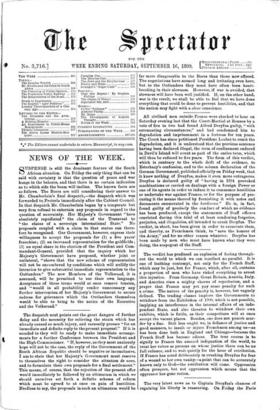The verdict has produced an explosion of feeling through- out
the world to which we can recollect no parallel. It is one of loathing contempt, not only for the French Staff, which may be just, but for France, which, after all, contains a proportion of men who have risked everything to arrest this injustice. From Germany, Great Britain, Austria, Italy, and America rises a mighty chorus of reprobation, and a prayer that France may yet pay some penalty for such a crime. The nature of the penalty is, however, but vaguely defined. The trading classes implore the Governments to withdraw from the Exhibition of 1900, which is not possible, implying an interference in the internal affairs of an inde- pendent State, and also threaten to withdraw their own exhibits, which is futile, as their competitors will at once accept the vacant places. Besides, one does not punish mur- der by a fine. Still less ought we, in defiance of justice and good manners, to insult or injure Frenchmen among us—as has been done both in England and Chicago—because the French Staff has become odious. The true course is to signify to France the amazed indignation of the world, to treat her rulers as persons on whose justice there can be no full reliance, and to wait quietly for the hour of retribution. If France has acted deliberately in crushing Dreyfus for fear of a wound to her own vanity—a point that can be accurately known only to God—the retribution will come. Oppression often prospers, but not oppression which means that the oppressor has gone rotten.


































